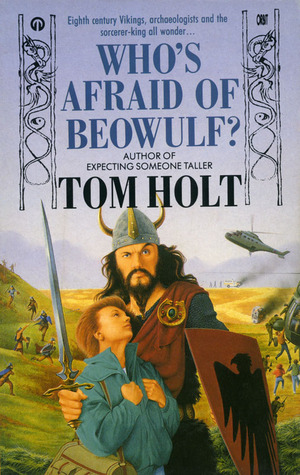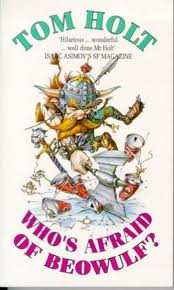“‘If the King says, “Charge that army over there,” and you say, “Which one?” and he says, “The one that outnumbers us twentyfold in that superb natural defensive position just under that hill with the sheep,” then you do it. And if it works you say, “What a brilliant general the King is,” and if it doesn’t you go to Valhalla. Everyone’s a winner, really.'”

Tom Holt‘s Who’s Afraid of Beowulf? is a goofy book about Vikings, as that quote up above should make perfectly clear. The premise is pretty simple: a crew of slumbering Norsemen are awoken for the first time in a thousand years when their enchanted burial site is disturbed by present day archaeologists in the north of Scotland. What ensues is a bizarre romp through Britain as the Vikings attempt to stop their ancient arch-nemesis, the evil sorcerer-king, from doing something terribly wicked and cruel. Along the way they complain about the taste of seagull meat, threaten BBC camera crews to do battle, and visit the British Museum to view its Viking artefacts.
Leading the bewildered Norsemen in their adventure in the modern era is Hildy, the archaeologist and main protagonist. The Norsemen themselves sport names familiar from the Sagas: Arvarodd, Bothvar Bjarki, etc., which is a nice touch. And last, and certainly least, in my view anyway, are the two electrical board-game-playing spirits known as Zxerp and Prexz who also accompany the Vikings. In general the book is akin to a Douglas Adams or Terry Pratchett novel, but with time-traveling Vikings as its “thing.” All in all, it’s a pretty fun time if you enjoy this sort of light-hearted nonsense.
And one final note: the book has absolutely nothing to do with Beowulf. There’s a passing reference to the old boy toward the end of the book, but all in all, it’s a title that makes very little sense. My guess is that the publisher decided that using the name Beowulf in the title would help it sell, but that’s just a guess. Maybe it was chosen for some other esoteric, artful reason to which I am completely blind. This would have all happened back in 1988 when the book was first published (I really drag my feet on these things). And in each addition released since then, it seems like the publishers have really nailed it with some bizarre cover artwork. I especially like the weird version up top with the guy dangling from the front of a long ship (something that never happens in the actual storyline).
Anyway, Who’s Afraid of Beowulf? is basically just an amusing, light read for those who enjoy the wit and humor in the passages that follow these other examples of some of the book’s wondrous covers:
“‘No, no,’ said Hildy. ‘I dig up ancient things buried in the earth. Things that belonged to people who lived hundreds of years ago.’
‘Do you really?’ asked the King. ‘We used to call that grave-robbing.'”
“‘I know a couple dealers of antiquities down in London…you remember London?’
‘Still going, is it?’ asked the King, raising an eyebrow. ‘You surprise me. I never thought it would last.'”
“When the sorcerer-king panicked, he tended to do so in Old Norse, which is a language admirably suited to the purpose, if you are not in any hurry.”
“The King overruled her; if Angantyr didn’t get something to eat other than rabbit pretty soon, he suggested, he would start to whine, and that he could do without.”
“‘The Castle of Borve,’ said the King, ‘was built for my father, Ketil Trout, by Thorkel the Builder. My father was a bit of a miser, I’m afraid, and, since he was forever going to war with all and sundry, usually very hard up. So when he commissioned the castle from Thorkel, the finest builder of his day, he stipulated that if there was anything wrong with the castle on delivery Thorkel’s life should be forfeit and all his property should pass to the King. Actually, that was standard practice in the building industry then.'”
“Arvarodd was staring. Hildy prodded him in the ribs, but he didn’t seem to notice. ‘That’s mine,’ he whispered.
‘Are you sure?’ asked Hildy.
”Course I’m sure. Given to me when I killed my first wolf. Sure, it’s only bronze, but has great sentimental value.’
‘Keep your voice down,’ Hildy hissed.
‘Bergthora said if I didn’t chuck it out and get a new one she’d give it to a museum,’ went on the hero of Permia. ‘I never thought she’d do it.'”
“‘It is time for us to go feast forever in Odin’s golden hall. Roast pork,’ he added before Angantyr could interrupt, ‘and all the mead you can drink. At the head of the table sits Odin himself; at his right hand Thor, at his left Frey. With her own hands Freyja pours the mead, and the greatest of heroes are the company. There we will meet many we have known, many of whom we have sent there, in the old wars which are now forgotten. They say that in Valhalla men go out to fight in the morning, and at night all those who have fallen rise up again to go to the feast, and fight again the next day. There is also, I am assured, a swimming pool and a sauna.'”
Subscribe to get updates from Scandinavian Aggression!
You know, if you feel like it or whatever. Your email is only used to send updates when new nonsense has been posted to the site. It's stored in the secure abyss of WordPress and not shared anywhere or anyhow else. Skål som fan!



